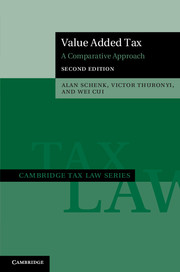Book contents
- Frontmatter
- Dedication
- Contents
- List of Tables and Charts
- List of Cases
- Preface to the Second Edition
- 1 Introduction
- 2 Consumption Tax Forms and Base Alterations
- 3 Varieties of VAT in Use
- 4 Registration, Taxpayer, and Taxable Activity
- 5 Taxable Supplies and Tax Invoices
- 6 The Tax Credit Mechanism
- 7 Introduction to Cross-Border Aspects of VAT
- 8 Timing and Valuation Rules
- 9 Zero-Rating, Exemptions, and Exempt Entities
- 10 VAT Evasion and Avoidance
- 11 Gambling and Financial Services (Other than Insurance)
- 12 Insurance
- 13 Real Property
- 14 An Anatomy of the Chinese VAT
- 15 Interjurisdictional Aspects
- Appendix VATs Worldwide
- Index
- References
11 - Gambling and Financial Services (Other than Insurance)
Published online by Cambridge University Press: 05 February 2015
- Frontmatter
- Dedication
- Contents
- List of Tables and Charts
- List of Cases
- Preface to the Second Edition
- 1 Introduction
- 2 Consumption Tax Forms and Base Alterations
- 3 Varieties of VAT in Use
- 4 Registration, Taxpayer, and Taxable Activity
- 5 Taxable Supplies and Tax Invoices
- 6 The Tax Credit Mechanism
- 7 Introduction to Cross-Border Aspects of VAT
- 8 Timing and Valuation Rules
- 9 Zero-Rating, Exemptions, and Exempt Entities
- 10 VAT Evasion and Avoidance
- 11 Gambling and Financial Services (Other than Insurance)
- 12 Insurance
- 13 Real Property
- 14 An Anatomy of the Chinese VAT
- 15 Interjurisdictional Aspects
- Appendix VATs Worldwide
- Index
- References
Summary
General Introduction
There are a group of services that pose particular problems under a credit-invoice VAT imposed on taxable transactions. They are gambling, transactions involving financial products that are priced to include implicit fees, and insurance (a particular kind of financial service). In all three cases, the value added by the service provider should be subject to a broad-based VAT, at least to the extent that it represents personal consumption expenditures. When early transaction-based, credit-invoice VATs were introduced in Europe and elsewhere, these kinds of services were difficult to include in the tax base because the credit-invoice VAT is based on charging tax on the consideration received by the supplier. For most financial services, the consideration is not explicitly stated. Moreover, financial services accounted for a much smaller percentage of personal consumption included in the VAT base than they do today.
Accordingly, it is not surprising that the default rule in early adopters of VAT was to exempt these services. Recently, some countries have been bringing gambling, more financial services, and casualty insurance into the VAT base. Many problems remain.
Gambling, Lotteries, and Other Games of Chance
In a typical transaction involving goods or services, a registered person remits to the government the difference between the tax on the price charged the customer and the tax on business inputs (such as inventory and supplies) used in making these sales. In a gambling transaction, whether a table game, a gaming machine, or a lottery, the gambler pays for the service (the chance to win) up front, and the value added cannot be calculated precisely until after winners are determined and winnings are paid out.
- Type
- Chapter
- Information
- Value Added TaxA Comparative Approach, pp. 347 - 390Publisher: Cambridge University PressPrint publication year: 2015

